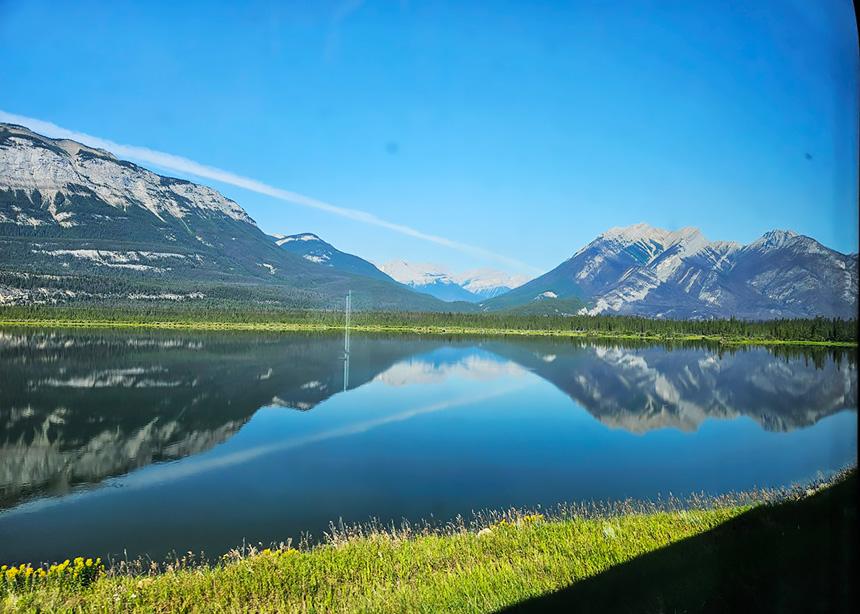The premise of the “Memories of Migration” Russlaender centenary train tour is a complicated one.
The July tour commemorated the journey of the historic migration of 21,000 Mennonites from Russia to Canada by taking a train and various other forms of transportation from Montreal to Abbotsford. The tour made many stops along the way as it followed the path taken by the Russlaenders. Participants examined the way Russlaenders built new communities and weathered hardship together.
But a closer look at the past and present circumstances of the Russlaender centenary reveals that telling stories of migration and ethnicity are rarely so concise and uncomplicated. Certain stops on the tour allowed for an exploration of some of the difficult and complicated elements of the Russlaender experience.
Mennonites are settlers. This was emphasized in many elements of the tour, but particularly in the conference entitled “The Russlaender Mennonites: War, Dislocation and New Beginnings,” hosted at the University of Winnipeg. The settler experience is ultimately one of displacement, both of those who settle and others. For settlers like Mennonites to occupy land, usually at the request of a nation or empire, the original inhabitants must lose their place on that land, and the settlers must move from elsewhere to occupy it.
The story of the Russlaender experience is one of displacement and loss and tragedy, but the way we tell our own stories of Mennonite migration often ignores other perspectives and fails to examine Mennonites as “implicated subjects,” a theme explored by Reina Neufeldt about the Kanadier Mennonite experience in Manitoba. She writes that “Mennonites saw Indigenous communities through initial stereotypes and pioneer lies (to be feared, satisfied) or as labour, and did not see the complexities of Indigenous communities, the everyday interactions as significant, nor the problematic structures around them, in which Mennonites played an important supporting role.”
The tour closed with a tour of Semá:th First Nation. This offered an excellent acknowledgement of the way that our own histories often succumb to pioneer lies about the consequences of the movement of Mennonites. Specifically, as emphasized by Richard Thiessen when he offered an apology on behalf of the Mennonite immigrants, our own histories have often failed to see, respect or understand the people who are displaced by our arrival.
Another complexity present in this tour was that ethnic Mennonites are not the same as the Mennonite church. Not in Canada, and especially not when looking at Mennonites globally.
When touring the churches in Yarrow, Arnold and Greendale, B.C., it became clear that while these churches were started by Russlaender Mennonites, today their membership is far more diverse, reflecting the changing demographics of the communities in which they are located. The racial and ethnic diversity of the Mennonite church is often at odds with how we tell our own history as ethnic Mennonites. This can risk alienating our fellow Mennonites who do not share our same familiar surnames, foods or linguistic background. And yet, as a historian, I think there is a time and place for telling these stories, as long as we understand that they are simply one aspect of the Mennonite experience in Canada.
Ethnic Mennonite immigration is part of that story, but so are the stories of Mennonite-sponsored Vietnamese refugees, and French-language Mennonite churches in Quebec, and Mennonite-run residential schools, and the stories of all the other people of varying backgrounds who have found their spiritual homes within Mennonite churches. The Mennonite church of 2023 is not the same as the Mennonite church in 1923, and while we can look back, we must also look forward.
Shelisa Klassen is a postdoctoral fellow at the Centre for Transnational Mennonite Studies at the University of Winnipeg. She participated in the third and final leg of the “Memories of Migration” tour.




Add new comment
Canadian Mennonite invites comments and encourages constructive discussion about our content. Actual full names (first and last) are required. Comments are moderated and may be edited. They will not appear online until approved and will be posted during business hours. Some comments may be reproduced in print.